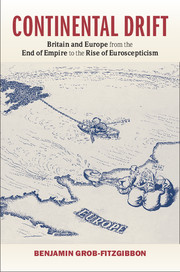Book contents
- Frontmatter
- Dedication
- Contents
- Acknowledgements
- List of abbreviations
- Introduction
- Part 1 Imperial Europeans
- Part 2 Post-imperial Eurosceptics
- 10 At sixes and sevens
- 11 Towards the Common Market
- 12 The rise of the anti-Marketeers
- 13 Empire eclipsed, Europe embraced, Britain rejected
- 14 Entering the promised land? Britain joins ‘Europe’
- 15 Seasons of discontent
- 16 Half-hearted Europeans
- 17 Mrs Thatcher, John Major and the road to European Union
- Conclusion: Post-imperial Britain and the rise of Euroscepticism
- Notes
- Bibliography
- Index
15 - Seasons of discontent
from Part 2 - Post-imperial Eurosceptics
Published online by Cambridge University Press: 05 May 2016
- Frontmatter
- Dedication
- Contents
- Acknowledgements
- List of abbreviations
- Introduction
- Part 1 Imperial Europeans
- Part 2 Post-imperial Eurosceptics
- 10 At sixes and sevens
- 11 Towards the Common Market
- 12 The rise of the anti-Marketeers
- 13 Empire eclipsed, Europe embraced, Britain rejected
- 14 Entering the promised land? Britain joins ‘Europe’
- 15 Seasons of discontent
- 16 Half-hearted Europeans
- 17 Mrs Thatcher, John Major and the road to European Union
- Conclusion: Post-imperial Britain and the rise of Euroscepticism
- Notes
- Bibliography
- Index
Summary
When it awoke on the morning of 1 January 1973 as a full member of the European Economic Community (EEC), the British public was deeply ambivalent. In a poll taken from 3–7 January 1973, 36 per cent of the public reported being ‘quite or very pleased’; 33 per cent were ‘quite or very displeased’ and an astonishing 20 per cent purported to be ‘indifferent’ (the remaining 11 per cent were undecided, but not indifferent). Even so, fully 51 per cent believed it would be a good thing for them and 66 per cent felt that it would be good for their children. Overall, Britons were not enthused about joining the EEC, with only a third pleased with the outcome, yet the majority – perhaps grudgingly – recognised that it was probably in the best interests of the country, particularly for its economic future.
The Prime Minister Edward Heath did not share this ambivalence. Claiming in his autobiography that the Conservative victory in the October 1971 debate was his ‘greatest success as Prime Minister’ and that signing the Treaty of Accession in January 1972 was the ‘proudest moment in my life’, he later wrote of his ‘thrill [that] setting out to establish a peaceful Europe had come to fruition’. He was not the only one to feel a sense of great accomplishment. One member of the cabinet described a ‘mood of euphoria in the Establishment’. On the night of the 1971 vote in Parliament, Harold Macmillan lit a bonfire of celebration on the cliffs of Dover, and David Heathcoat-Amery – who was later to become a leading Eurosceptic in the Conservative Party – cracked open a bottle of champagne. Margaret Thatcher, who by this point had experienced a rapid rise through the parliamentary ranks to become Secretary of State for Education, was ‘wholeheartedly in favour of British entry’, although became somewhat concerned about the ‘psychological effect [entry had] on Ted Heath. His enthusiasm for Europe had already developed into a passion. As the years went by it was to become an obsession’.
- Type
- Chapter
- Information
- Continental DriftBritain and Europe from the End of Empire to the Rise of Euroscepticism, pp. 367 - 399Publisher: Cambridge University PressPrint publication year: 2016

